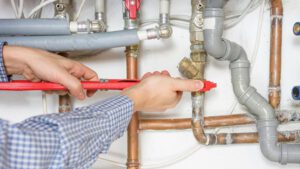Why Hire a Plumber?
Plumbers connect, repair, and maintain pipes and fixtures that carry water, gas, or other fluids. These tradespeople may also work on sewage and drainage systems.
A good plumber prioritizes safety, is punctual, and can work well under pressure. A career as a plumber offers low stress, flexibility, and upward mobility.
Plumbers install, maintain, and repair pipes, valves, fixtures, and other plumbing equipment in residential and commercial properties. They also handle emergencies, analyzing their causes and determining the best course of action to resolve them.
They may use a variety of hand and power tools to perform their duties. These include wrenches, screwdrivers, pliers, and saws. They must be able to work safely and with good communication skills, both verbal and nonverbal.
Most plumbers begin their careers as apprentices, and they are trained to a specific degree of expertise in their field. This training includes apprenticeship, on-the-job education, and technical school courses. Upon completion, they are awarded a journeyperson certificate and can write the Interprovincial Plumbing Exam to earn a Red Seal.
Some plumbers specialize in certain areas, such as sanitation or air conditioning. They can then become an estimator or team leader and move up to a more senior position. Alternatively, they can pursue a higher diploma or a degree to advance their career as an engineer.
Plumbers are required to be licensed by the state in which they operate. They are paid a salary that is equal to or higher than that of other construction trade workers. However, their earnings depend on the type of job and region they work in.
Generally, plumbers work full-time and may be on call during peak periods. Their average workweek is 40 hours per week. Overtime (working more than eight hours a day) is often required for projects that take longer to complete.
In addition, they must be available for work on holidays and weekends. Some are self-employed and set their own schedules.
Their job duties can include a wide range of tasks that require physical strength and working in confined spaces, often in the rain. They must be able to climb ladders and scaffolding and carry heavy materials.
As a plumber, you must also be able to work independently and solve problems quickly and efficiently. You must be able to communicate effectively with other construction professionals and your clients.
The job outlook for plumbers is excellent, with an expected 15% growth between 2016 and 2026. This is faster than the average for all occupations.
Plumbing is a trade that requires extensive training and education in order to be successful. Generally speaking, a four-year degree is the minimum required to get into the plumbing industry, although some plumbers begin their careers through apprenticeships.
Typically, an apprentice plumber spends four to five years in a paid apprenticeship under a licensed plumber. During this time, they receive 2,000 hours of paid training and technical instruction. The program teaches them about the different plumbing tools and equipment they will use, local plumbing codes, safety procedures, and blueprint reading.
After completing their apprenticeship, many plumbers pursue a bachelor’s degree in a related field to advance their careers. This can include plumbing, pipefitting, or welding. Some plumbers also choose to pursue a master’s degree in this area.
In addition to formal educational programs, plumbers can obtain a number of certifications to improve their marketability and pay. These may include a certification from the United Association of Plumbers, Fitters, and Welders and membership in the National Society of Black Professional Plumbers.
Throughout your career as a plumber, you will have to meet licensing requirements in your state or jurisdiction. The specifics will vary by city or county, but they often involve a written and practical exam.
For example, you will need to complete a registered apprenticeship program and have at least two years of journeyman experience. Once you have this, you can apply for a license to work as a plumbing contractor.
The training you receive will usually be through an apprenticeship or through a plumbing trade school or college. The trade schools offer a four- to five-year program that combines theory with hands-on practice.
There are also a few high schools that offer short courses in plumbing. Depending on the school, you might learn the basics of this trade while earning your high school diploma.
Alternatively, you could earn a four-year or two-year associate’s degree in plumbing or a bachelor’s degree in an engineering or construction field. There are several trade colleges and scholarships available to help defray the costs of attending a college or trade school.






